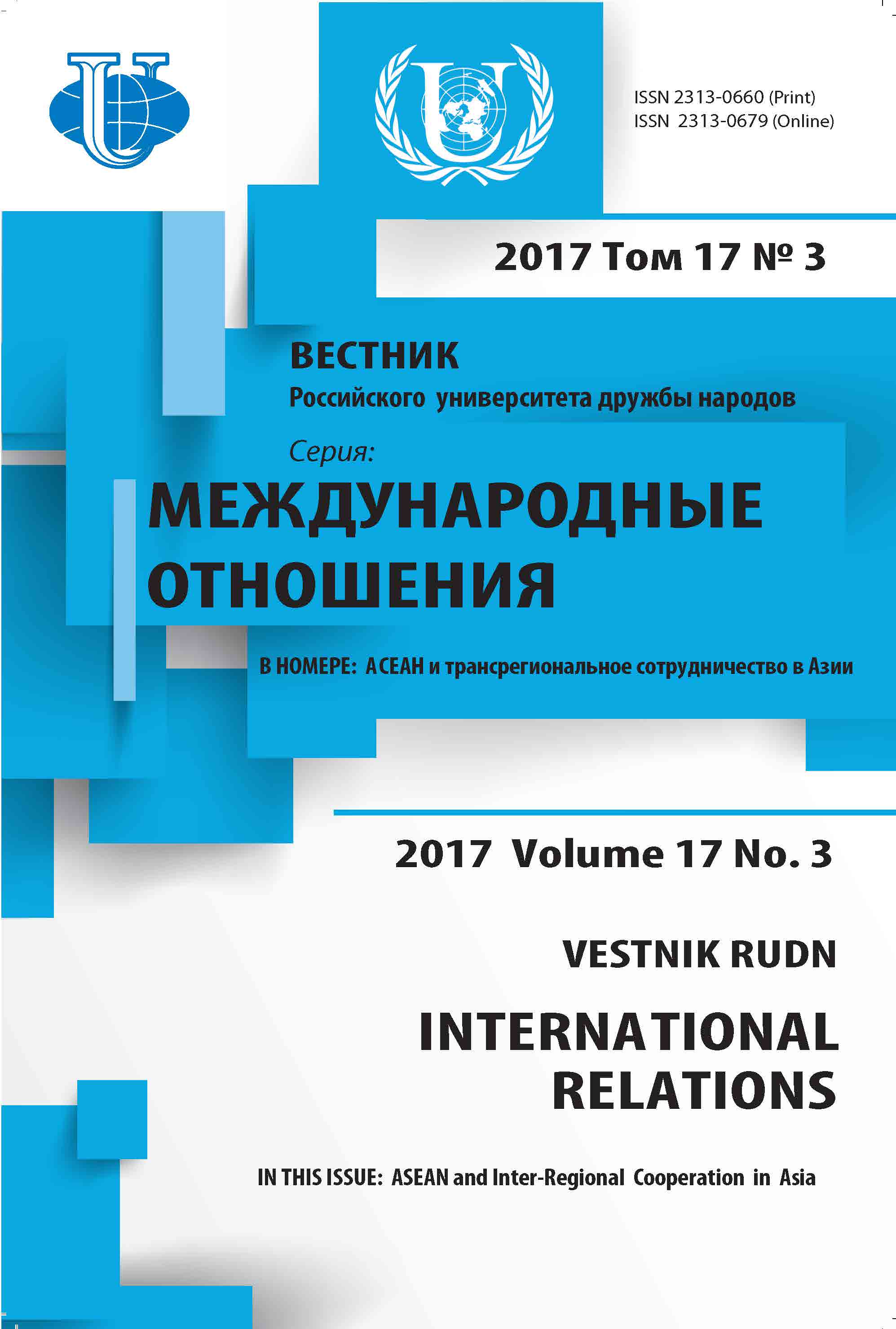CONTEMPORARY FEATURES OF COOPERATION BETWEEN RUSSIA AND KAZAKHSTAN IN HIGHER EDUCATION
- Authors: Burangulov ER1
-
Affiliations:
- Ufa State Petroleum Technological University, Ufa, Russia
- Issue: Vol 17, No 3 (2017): ASEAN and Inter-Regional Cooperation in Asia
- Pages: 612-619
- Section: INTERNATIONAL EDUCATIONAL COOPERATION
- URL: https://journals.rudn.ru/international-relations/article/view/16772
- DOI: https://doi.org/10.22363/2313-0660-2017-17-3-612-619
- ID: 16772
Cite item
Full Text
Abstract
The article reveals and compares the features and trends of the public policy in the sphere of higher education in Russia and Kazakhstan on the materials of programs, concepts, regulations and speeches of officials in the sphere of educational cooperation. The general factors defining orientation of such inter-action (following to the Bologna agreement and orientation to reconstruction of uniform educational space) and also particular factors are allocated (decentralization and aspiration to nation-building in Kazakhstan, centralization of an education system in Russia). Such problem as transformation of the Bologna system into the channel of recruiting by the leading countries of the most successful and perspective university graduates of Russia and Kazakhstan is accented. The main bilateral educational projects are considered: Network University of the CIS and University of the Shanghai Cooperation Organization. Two main conclusions are drawn. First, that orientation to the Bo-logna system became the response to changes of social installations and economic situation in the world. Second, such development and the actual strategies of public policy in the sphere of educational cooperation need to be adjusted in accordance with national traditions with the aim of preserving and enhancing the ac-cumulated intellectual, scientific and technical, cultural potential and sustainable socio-political development of Russia and Kazakhstan.
About the authors
E R Burangulov
Ufa State Petroleum Technological University, Ufa, Russia
Author for correspondence.
Email: emilburangulov@mail.ru
post-graduate student of Department of political science, sociology and philosophy, Ufa State Petroleum Technological University (USPTU)
References
- Adilhanuly, N.A. (2014). Competition between leading international schools for the future of Kazakh¬stan. Vestnik RUDN. International Relations, 4, 201—206. (in Russ.).
- Baidenko, V.I. (2006). Bologna process: problems, experience, solutions. Moscow: Issled. tsentr prob¬lem kach-va podg. spetsialistov. (in Russ.).
- Burkhalter, N. & Shegebayev, M.R. (2012). Critical thinking as culture: Teaching post-Soviet teachers in Kazakhstan. International Review of Education, 58 (1), 55—72.
- Dneprov, E.D. (2011). The newest political history of Russian education: experience and lessons. Mos¬cow: Marios. (in Russ.).
- Dorozhkin, Yu.N. (2012). Actual problems of modernization of the political system of Russia. Vlast, 10, 10—13. (in Russ.).
- Dorozhkin, Yu.N. & Bikmetov, E.Y. (1997). The organization of public relations in the administrative and government. Ufa: Ufa state petroleum technological university. (in Russ.).
- Filippov, V.M. (2015). Internationalization of Higher Education: the main trends, problems and pro¬spects. Vestnik RUDN. International Relations, 15 (30), 203—211. (in Russ.).
- Filippov, V.M. & Sun, Y. (2015). The role of the Shanghai Cooperation Organization University in the mate educational spaces of Eurasia. Public service, 6 (98), 15—17. (in Russ.).
- Kovalenko, S.A. & Smolik, N.G. (2014). Participation of Peoples’ Friendship University of Russia in the activities of CIS Network University. Vestnik RUDN. International Relations, 15 (30), 207—213. (in Russ.).
- Lee, С. (2004). Languages and Ethnic Politics in Central Asia: The Case of Kazakhstan. Journal of International and Area Studies, 11 (1), 101—116.
- Manykin, A. (Eds.). (2010). Models of regional integration: past and present. Moscow: Olbi Print. (in Russ.).
- Milestones. The intelligentsia in Russia. (2001). Moscow: Molodaya gvardiya. (in Russ.).
- Navodnov, V.G. & Motova, G.N. (2008). Examination of the quality of education: the European ap¬proach. Moscow: Natsionalnoe akkreditatsionnoe agentstvo v sfere obrazovaniya, 2008. (in Russ.).
- Problems of formation of state policies in Russia: materials of the All-Russian Scientific Con-ference. (2006). Moscow: Nauchniy ekspert. (in Russ.).
- Schweitzer, G.E. (2008). Science Policy in Kazakhstan. Science. New Series. 322 (5907), 1474—1475.
- Volkov, A.E., Kuz'minov, Ya.I., Remorenko, I.M., Rudnik, B.L., Frumin, I.D. & Yakobson, L.I. (2008). Russian Education 2020: the Model of Education for the Innovative Economy. Voprosy obrazo¬vaniya, 1, 32—64. (in Russ.).
- Yakovlev, M.V. (2011). The political image of the region in today’s Russia. Moscow: MAKS Press. (in Russ.).
- Yakovlev, M.V. (2014). The Importance of the Political and Cultural Factor in the Concept of Demo¬cra-tization of Seymour Lipset. Nauka i obrazovanie v XXI v.: sbornik nauchnyih trudov po materialam Mezhdunarodnoy nauchno-prakticheskoy konferentsii; Tambov: Yukom, p. 162—163. (in Russ.).
- Yashchuk, T.V. (2013). The state policy of the Russian Federation and the Republic of Kazakhstan in the field of higher education: a comparative legal analysis. Vestnik Omsk University. Series: Right, 2, 70—74. (in Russ.).
- Zhukova, A. (2008). State policy of the Russian Federation and the Republic of Kazakhstan in the field of higher education: comparative legal analysis. Vlast, 1, 21—22. (in Russ.).
Supplementary files










